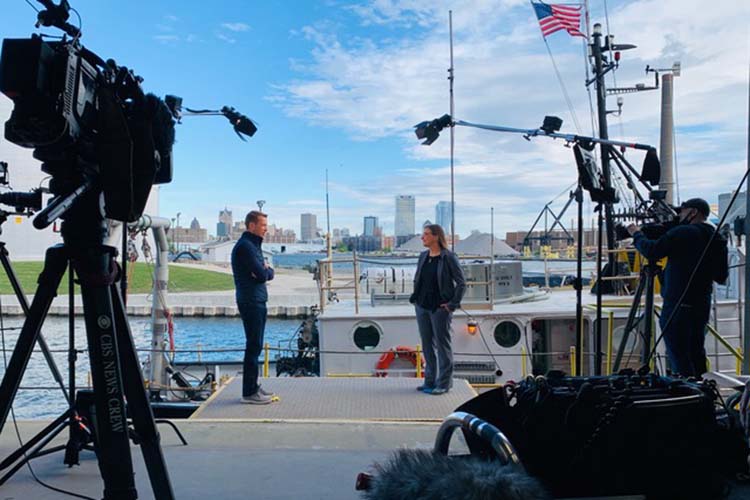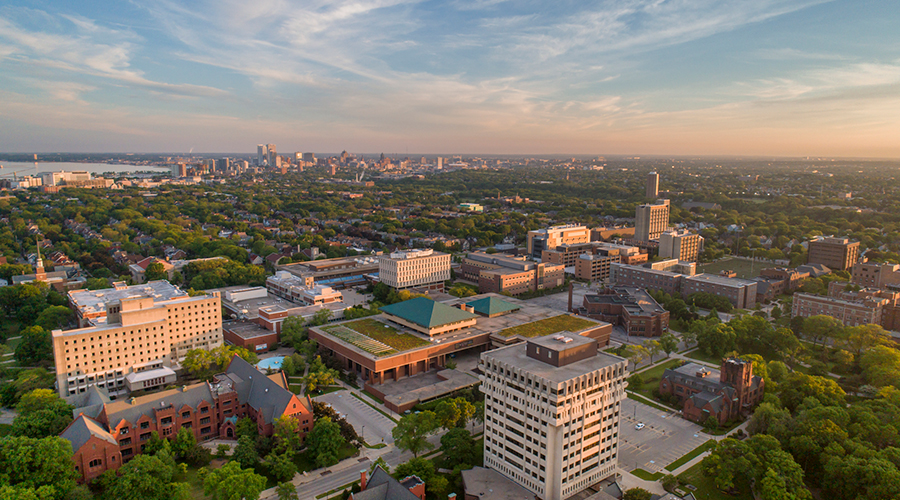Freshwater Sciences, MS: Water Policy (Thesis) MS
Are you interested in the economics and politics of water? Ready to be part of the next generation of water policymakers?
The water policy thesis track in the Master of Freshwater Sciences offers an interdisciplinary, research-based program that will prepare you for a career in research and industry, or to further your studies in a PhD program. Thesis track students work closely with water policy and economics experts to conduct original research and learn how to develop water policy that offers solutions for long-term environmental health and quality of life.
Schedule a Graduate Program Information Session
Program Type
Master’s
Program Format
On Campus
Water Policy That Creates Change.
The School of Freshwater Sciences is home to the Center for Water Policy, which connects water policy experts from throughout UW System. You will have opportunities to learn from legal experts and natural resource economists who know how to bridge the gap between science, policy and water resource management. Your research will prepare you to develop interdisciplinary solutions to freshwater issues.

Turn science into action with a freshwater sciences master’s degree specializing in water policy.
While earning your graduate degree, you will
- Learn from world-class faculty within a small-class environment.
- Build a multidisciplinary science foundation.
- Develop in-demand technical and professional skills.
- Gain research experience working with experts in water policy and economics.
Students in the MS thesis program must be accepted by a faculty member who will serve as the major professor and be primarily responsible for matriculation.
The School of Freshwater Sciences admits new thesis students for fall and spring semesters.
- Fall applications are due January 31
- Spring applications are due October 1
You must meet Graduate School requirements in addition to the following to be considered for admission:
A bachelor’s degree in biology, chemistry, economics, geosciences, mathematics, physics, public policy, or other appropriate natural science, social science or engineering discipline.
Applicant must have at least a 3.0 undergraduate GPA. All of an applicant’s undergraduate coursework completed before award of the first undergraduate degree is included in the GPA computation. For courses that were repeated for credit, each attempt is included.
Those whose undergraduate GPA is below 3.0 should contact Aaron Thiel, Graduate Program Manager, for guidance. Applicants may be considered for admission if they are able to provide evidence of their ability to succeed in graduate study.
All applicants, including UWM students, must upload an official or unofficial transcript into the Panthera admission application system for all work done at higher education/postsecondary institutions. All applicants who are admitted to the Graduate School will be required to submit an official transcript with the degree posted within two weeks of the beginning of their first semester of enrollment.
The reason statement is an essential part of the application. It is used to determine the appropriateness of your educational and professional goals and serves as an example of your ability to express yourself in writing. Your reason statement should include:
- your reasons for pursuing graduate study
- your specific background interests and background in the field
- any relevant skills or training you’ve acquired
- any academic awards or honors you have received
Submit a current resume that clearly articulates your professional experience.
Submit a scholarly writing sample that demonstrates critical thinking and writing skills.
Three letters of recommendation are required by persons who can attest to your scholarship and/or research potential and your success in graduate school at the School of Freshwater Sciences.
List relevant courses taken at previous institutions. Please include course number, course title, credits and final grade (example: BioSci 150, Foundations of Biological Sciences, 4 credit, A-). The following prerequisites are strongly recommended:
- at least one semester of coursework in three of the following at the college level: chemistry, biological sciences, physics, calculus, microeconomics, statistics, political science or advanced algebra.
- one additional semester of chemistry, biological sciences, physics, microeconomics, geographic information systems, or statistics.
GRE scores are not required, but are strongly recommended.
Minimum degree requirement is 31 graduate credits.
| Code | Title | Credits |
|---|---|---|
| Required courses | ||
| FRSHWTR 585G or ATM SCI 500G | Applied Water Statistics and Data Manipulation 1 Statistical Methods in Atmospheric Sciences | 3 |
| FRSHWTR 781 | Water Law for Scientists and Policy Makers | 3 |
| FRSHWTR 890 | Science Communication | 3 |
| FRSHWTR 900 | Colloquium in Freshwater Sciences | 1 |
| Choose one of the following four courses: | 3 | |
| FRSHWTR 502G | Aquatic Ecosystem Dynamics | |
| FRSHWTR 504G | Quantitative Freshwater Analysis | |
| FRSHWTR 506G | Environmental Health of Freshwater Ecosystems | |
| FRSHWTR 583G | Cost-Benefit Analysis for Environmental Resource Decisions | |
| Master’s Research and Thesis Credits | 6 | |
| FRSHWTR 985 | Master’s Research and Thesis (Up to 6 credits) | |
| Electives | 12 | |
| Select 12 credits in consultation with the students major advisor | ||
| Total Credits | 31 | |
Freshwater sciences master’s thesis students are typically funded through faculty research projects. We strongly recommend you reach out to faculty members whose interests align with your own to discuss potential research and funding opportunities. Current research assistantship opportunities.
The School of Freshwater Sciences also offers competitive assistantships and scholarships. For more information about other financial aid options, please visit UWM Financial Aid.
Graduates of our MS thesis programs have high placement rates. More than 89% went into a water-related job 11% enrolled in a PhD program.

